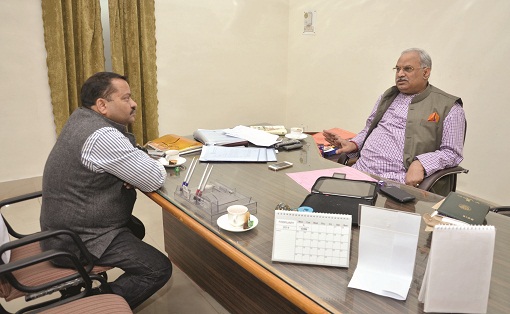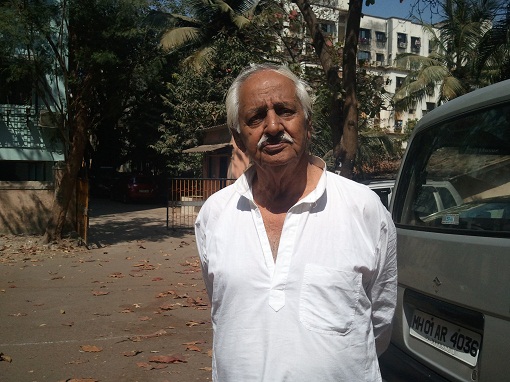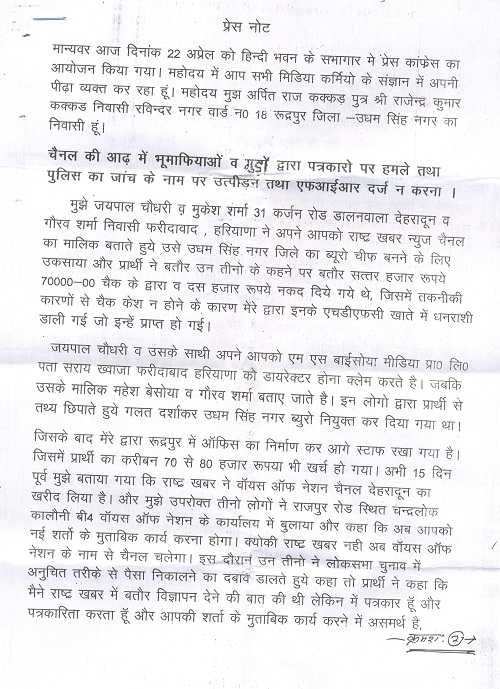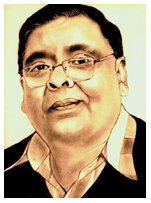New Delhi- Sheikh Manzoor Alam, former editor on UNI Urdu news service, said the deterioration in the standards of Urdu media is due to commercialization of the fourth estate as also seen in other language papers. Earlier, especially during freedom struggle, journalism was a dedicated mission. He lamented the recent decline in Urdu readership. Its performance, for example, in UP with a population of nine million people speaking Urdu, is poor today, although it is set to flourish in places like Hyderabad.
Presiding a brain storming session on “political and social perspectives of Urdu Journalism” at India Policy Foundation (IPF) in New Delhi, He said as production became easier after the technological revolution, corporate houses have entered the Urdu media business. He suggested only continuous dialogue and giving them a sense of belonging can solve the problem of Muslim alienation from the mainstream.
Senior Journalist & social Activist Syed Asdar Ali said that Urdu newspapers should redefined their priorities on news in the larger interest of the urdu readership. He said that Urdu Media can play a constructive role and can set an example of social harmony. Criticizing few Urdu dailies for using their space to create gulf between communities, he said that it is just to gain the cheap popularity and it also violates the norms set by the Press Council of India.
Asdar Ali said, Urdu newspapers carry a big responsibility of guiding the Urdu readership to a right path, so their role should be constructive. He said their policy and priority to select news should not be bone of contention.
Giving an instance of one of the largest circulated Urdu daily recently giving banner headline on the first page to a news on insult of a religious book in Sadipet near Hyderabad, Asdar Ali said highlighting these type of report will only divide the communities and can create communal disturbances. He said they need to correct their priorities of news selection and also the editorial policies.
He said what happened in Sadipet in Andhra Pradesh must be criticized in the strongest words, but a Urdu daily, by publishing the scan copy of the holy book has itself brought disregard to the holy book, as once after reading the newspaper, it becomes useless and even sometime goes into waste bin. Asdar said, highlighting this in such a manner will not serve the purpose rather will only create division between the communities, which can never be appreciated.
Asdar Ali said, Urdu newspapers should try to make their readers aware of political, social and economical happenings in the country, so that they can also participate in such debates and can play their roles for the betterment of the society in particular and country in general.
Participating in the discussion, Prof. Rakesh Sinha, Director IPF said, Urdu media functions with an agenda exclusively of a community and therefore has its readership pre-defined and limited. Introducing the importance of the subject he said even people like Teesta Setelvad and the editor of Milli Gazette Zafarul Islam Khan too agreed that Urdu newspapers believe in Conspiracy theory. He gave the example the news published by these papers of recent communal riots in Rudrapur and Bharatpur. They not only violated the norms set by the press Council of India, but also tried to create mistrust and feuds between religious communities.
He said that the objective of research on the topic is to critically examining their role as an important component of the Fourth Estate. Media of all shades must be inclusive in their approach. They must avoid news and views which create provocation, weaken nationalist feeling and damage social harmony, he said. The gensralisation that Urdu newspapers get only one percent advertisements from the DAVP is wrong as it conveys that they are discriminated. However, the fact is altogether different. Their popular newspapers get adequate advertisements but how can those which are published merely for the sake of publication. He gave example of more than a dozen newspapers have been published from Laxmi Nagar, a small area in Delhi.
At the session, Senior Journalists, Manmohan Sharma and Satish Pednekar presented their interim papers on the work so far done under the project on Urdu media, started nine months ago. Narrating the growth and development of Urdu and Urdu press in India, Manmohan Sharma said the media had made their share of contribution to India’s freedom struggle. However, he said, papers run by political parties came a cropper by 1990s, Quami Awaz editions of Lucknow and New Delhi published by Associated Journals founded by Jawaharlal Nehru being examples. Today, major part of Urdu print media business has gone into the hands of corporate..
Former Bureau Chief of Jansatta newspaper, Satish Pednekar, presenting his paper, found fault with its narrow perspective of dealing with the concerns of one community alone, although living without any regional exclusiveness, he said the media by and large has lost the professional moorings. Distortions have crept in the selection of news. Even news of national and international importance gets lopsided treatment, with the result that even bigger issues like budget or planning are seen from the perspective of the community’s own benefits only. The media is in the grip of a persecution mania as also the community. A strict adherence to fundamentalism has blocked technology and modernism from benefiting the community, he added.
Mohammad Jamshed Hasan , Assistant General Manager –marketing of urdu daily Inquilab, said Urdu readership is declining but there are good prospects for business. He sees that the Muslims’ economic condition is by and large improving and their life style too is undergoing change of late under the impact of modernisation.
Participating in the discussion, Prof Rajvir Sharma said the Urdu press has to uphold equity and should highlight issues of general social and national importance and join the mainstream. Ms. Sushma Wahengbam welcomed the guests and Jayram Viplav delivered the vote of thanks. Press Release





